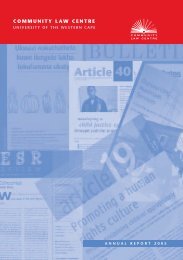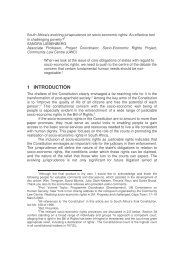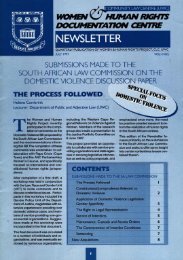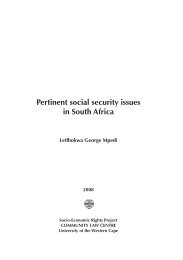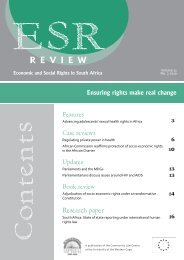ESR Review Volume 11 No 1 - January 2010 - Community Law Centre
ESR Review Volume 11 No 1 - January 2010 - Community Law Centre
ESR Review Volume 11 No 1 - January 2010 - Community Law Centre
Create successful ePaper yourself
Turn your PDF publications into a flip-book with our unique Google optimized e-Paper software.
<strong>11</strong><br />
housing and under the Housing Act (para 62). The Court<br />
therefore disagreed with the City’s contention that the<br />
provincial government should be joined on the basis that<br />
the City had no greater obligation than to seek financial assistance<br />
from the province and was confined to the role of<br />
a bystander (para 68). This was because local government<br />
had the primary responsibility to make provision for housing<br />
on a progressive basis having regard to its availability<br />
of resources (para 81). The Court did not therefore find it<br />
desirable to join the provincial government even if it had<br />
an interest in the outcome (para 82).<br />
It is worth emphasising that the Court’s finding on the<br />
joinder of the provincial government should not, however,<br />
be seen by the provincial government as an escape hatch<br />
in relation to its duty to ensure that it allocates the necessary<br />
resources to local government to enable local government<br />
meet its obligations to unlawful occupiers. Local<br />
government must in turn ensure that it not only brings to<br />
the attention of the province its housing needs, but also<br />
follows up to ensure that these are included in the budgeting<br />
and planning processes.<br />
The City’s obligation to unlawful occupiers of private<br />
land<br />
The Court reiterated the general obligation of the City to<br />
ensure that desperately poor people were not rendered<br />
homeless (para 128). The City was required to take reasonable<br />
measures through a coherent housing programme<br />
towards the progressive realisation of the right to have<br />
access to adequate housing (para 129). This included facilitating<br />
access to temporary housing for people living in<br />
intolerable conditions with no roof over their heads (para<br />
130).<br />
The City had failed to justify its policy of not providing<br />
emergency housing to indigent occupiers of private land<br />
who were threatened with eviction (para 140). The Court<br />
thus attributed the lack of budgetary allocation for this<br />
group to their exclusion, which it found to be unjustifiable<br />
(para 141). It also found that the exclusion was in violation<br />
of the right of the occupiers to equal protection and<br />
benefit of the law under section 9(1) of the Constitution.<br />
The exclusion further limited their enjoyment of the right<br />
to have access to emergency or temporary housing under<br />
section 26 of the Constitution (para 144).<br />
The Court then concluded that this amounted to unfair<br />
discrimination, which in turn rendered the City’s policy<br />
and its implementation constitutionally flawed, irrational<br />
and unreasonable (paras 144–145). The City was therefore<br />
found to have breached its constitutional and statutory<br />
obligations towards the occupiers by precluding them<br />
from accessing emergency and temporary housing programmes<br />
for a period of at least four years (para 172). The<br />
Court stressed that the City was constitutionally obliged<br />
to include indigent people occupying private land and facing<br />
eviction in its housing programmes and budget (para<br />
177), and should avoid disrupting the lives of the occupiers<br />
by relocating them (para 181). The Court then ordered<br />
the City to provide the occupiers with, at least, temporary<br />
accommodation in a location as near as possible to their<br />
present location (para 196). In its order, the High Court required<br />
the City to report back on the steps it had taken and<br />
would take in future and the time frames within which the<br />
steps would be taken (para 196).<br />
The City’s obligation to private landowners<br />
The Court reiterated that it was unreasonable for a private<br />
entity to bear the burden that should be borne by the state<br />
of providing occupiers with accommodation (para 132). By<br />
unfairly discriminating against the unlawful occupiers, the<br />
City had also breached the right of Blue Moonlight Properties<br />
to be treated equally (paras 151 and 154) and deprived<br />
it of its entitlement to use and develop its property (paras<br />
153 and 162). With regard to an appropriate remedy for<br />
this breach, the Court observed that it would be inappropriate<br />
to order expropriation in this case (para 159). As had<br />
been held in the Modderklip case, the High Court found<br />
that constitutional damages were appropriate in this case.<br />
Consequently, it ordered the City to pay Blue Moonlight<br />
Properties damages up to the date when the eviction order<br />
was effected and the occupants vacated the premises<br />
(para 171). The amount was to be determined by agreement<br />
between the occupiers and the City. Additionally, the<br />
City had to provide the occupiers with at least temporary<br />
accommodation or, alternatively, pay each occupier R850<br />
a month for rent (para 196).<br />
Conclusion<br />
The judgment illustrates the relationship between subsections<br />
(1), (2) and (3) of section 26 of the Constitution. It further<br />
recognises not just the importance of housing rights,<br />
but also the importance of a landowner’s right to the use<br />
of and benefit from its property. It reiterates the importance<br />
of taking both these interests into consideration in<br />
eviction cases. The decision also provides guidance and<br />
clarity on the obligations of organs of state, particularly<br />
local government, in private evictions. It emphasises that<br />
local government cannot deny its duties towards unlawful<br />
occupiers in private eviction applications. In addition, the<br />
judgment is part of an emerging trend of courts increasingly<br />
issuing supervisory orders requiring the government<br />
to report on the implementation of court orders.<br />
Lilian Chenwi is the coordinator of, and senior<br />
researcher in, the Socio-Economic<br />
Rights Project.<br />
The full judgment is available at<br />
http://www.saflii.org/za/cases/ZAGPJHC/<strong>2010</strong>/3.pdf.<br />
<strong>ESR</strong> <strong>Review</strong> Vol <strong>11</strong> <strong>No</strong>. 1 <strong>2010</strong>






